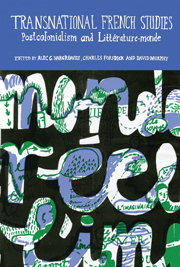Book contents
- Frontmatter
- Contents
- Acknowledgements
- Introduction: What Does Littérature-monde Mean for French, Francophone and Postcolonial Studies?
- From World Literature to Littérature-monde: Genre, History and the Globalization of Literature
- Postcolonialism, Politics and the ‘Becoming-Transnational’ of French Studies
- Mapping Littérature-monde
- Littérature-monde, or Redefining Exotic Literature?
- From Littérature voyageuse to Littérature-monde via Migrant Literatures: Towards an Ethics and Poetics of Littérature-monde through French-Australian Literature
- Littérature-monde and the Space of Translation, or, Where is Littérature-monde?
- Littérature-monde or Littérature océanienne? Internationalism versus Regionalism in Francophone Pacific Writing
- The World and the Mirror in Two Twenty-first-Century Manifestos: ‘Pour une “littérature-monde” en français’ and ‘Qui fait la France?’
- The Post-Genocidal African Subject: Patrice Nganang, Achille Mbembe and the Worldlinesss of Contemporary African Literature in French
- Afterword: The ‘World’ in World Literature
- Appendix: Toward a ‘World-Literature’ in French
- Notes on Contributors
Littérature-monde, or Redefining Exotic Literature?
from Mapping Littérature-monde
- Frontmatter
- Contents
- Acknowledgements
- Introduction: What Does Littérature-monde Mean for French, Francophone and Postcolonial Studies?
- From World Literature to Littérature-monde: Genre, History and the Globalization of Literature
- Postcolonialism, Politics and the ‘Becoming-Transnational’ of French Studies
- Mapping Littérature-monde
- Littérature-monde, or Redefining Exotic Literature?
- From Littérature voyageuse to Littérature-monde via Migrant Literatures: Towards an Ethics and Poetics of Littérature-monde through French-Australian Literature
- Littérature-monde and the Space of Translation, or, Where is Littérature-monde?
- Littérature-monde or Littérature océanienne? Internationalism versus Regionalism in Francophone Pacific Writing
- The World and the Mirror in Two Twenty-first-Century Manifestos: ‘Pour une “littérature-monde” en français’ and ‘Qui fait la France?’
- The Post-Genocidal African Subject: Patrice Nganang, Achille Mbembe and the Worldlinesss of Contemporary African Literature in French
- Afterword: The ‘World’ in World Literature
- Appendix: Toward a ‘World-Literature’ in French
- Notes on Contributors
Summary
The argument developed within this chapter is framed within a paradox that is central to the notions of littérature-monde and Francophone literature. Each of these literatures challenges, and frequently denounces, exoticism as a concept directly inherited from the colonial past whilst simultaneously pursuing a search for new forms capable of representing the world's diversity. For both littérature-monde and Francophone literature, exoticism is the appropriation of the other expressed through a hegemonic discourse that more often than not returns us to the West. Whether it functions as the source of dreams or of fantasies of the other, exoticism is one of the driving forces of all forms of Orientalism.
Criticism of exoticism thus forms part of the worthwhile project of deconstructing the Western subject insofar as the latter must now recognize and reveal the ideologies that subject brings to bear on his or her perception of the other. However, the aim of this disclosure is not so much to silence the Western subject as to seek out the places where the voice of the other can be found and heard and also to reveal the location of exoticism's formulation. In this way, the very idea of Francophonie can be said to have arisen from the desire to recognize the position of non-hexagonal French literary voices and the contribution of their cultural, geographic and linguistic differences. As a site of recognition, Francophone literature made audible the voice of writers who hitherto had been deprived of a space within which to disseminate such difference.
- Type
- Chapter
- Information
- Transnational French StudiesPostcolonialism and Littérature-monde, pp. 195 - 208Publisher: Liverpool University PressPrint publication year: 2010



